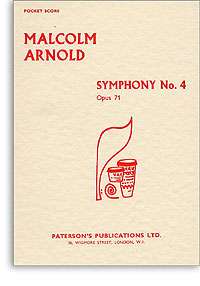Symphony No. 4 (Arnold)

The Symphony No. 4, Op. 71 by Malcolm Arnold was finished on 13 July 1960. It is in four movements:
- Allegro
- Vivace ma non troppo
- Andantino
- Con fuoco
The work was commissioned by William Glock for the BBC. The composer conducted the first performance with the BBC Symphony Orchestra on 2 November 1960 at the Royal Festival Hall.
The composer wrote in 1971 that the symphony was a reaction to the Notting Hill race riots of 1958. He was appalled that such a thing could happen in Britain. And expressed his hope that it might help to spread the idea of racial integration.
Instrumentation
The symphony is scored for the following large orchestra:
Piccolo, 2 flutes, 2 oboes, 2 clarinets, 2 bassoons, contrabassoon, 4 horns, 3 trumpets, 3 trombones, tuba, timpani, bass drum, snare drum, bongos, tom-toms, maracas, tam-tam, marimbaphone, celesta, harp and strings.
Commercial recordings
- 1974 Malcolm Arnold and the BBC Symphony Orchestra on ARIES LP (Bootleg of the 2nd performance in 1960, the credits on the LP are bogus)
- 1990 Malcolm Arnold and the London Philharmonic Orchestra on Lyrita SRCD.200 (Lyrita's first CD only release)
- 1994 Richard Hickox and the London Symphony Orchestra on Chandos Records CHAN 9290
- 1996 Vernon Handley and the Royal Liverpool Philharmonic on Conifer Records 75605-51258-2 (re-released on Decca 4765337)
- 1998 Andrew Penny and the RTÉ National Symphony Orchestra on Naxos Records 8.553739
References
- Chester-Novello page on the Symphony Contains programme notes by the composer.
- Malcolm Arnold writing in The Listener, 14 October 1971
- A programme note by Paul Serotsky